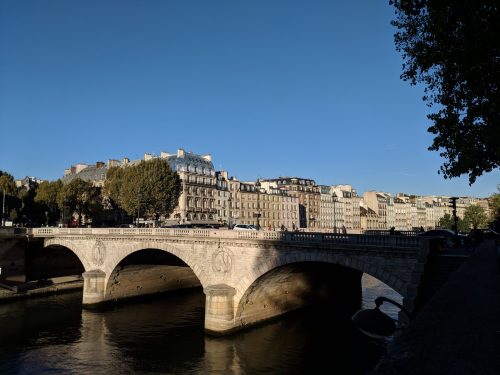
Pittsburgh, Pennsylvania often gets compared to Paris, France. When former President Trump withdrew from the Paris Climate Accord in 2017, he said, “I was elected to represent the citizens of Pittsburgh, not Paris.” Pittsburgh Mayor Bill Peduto was quick to refute Trump and express Pittsburgh’s commitment to the Paris Agreement’s goals.
Most recently, Senator Ted Cruz of Texas condemned President Biden for rejoining the Paris Climate Accord: “By signing this order, President Biden indicates that he’s more interested in the views of the citizens of Paris than in the jobs of the citizens of Pittsburgh,” he said.
Cruz then created a bumper sticker that said “Pittsburgh>Paris.”

Pittsburghers were quick to troll Cruz on the internet, telling him to “keep Pittsburgh’s name out of your mouth.” Mayor Bill Peduto also reminded Cruz that the senator does not represent the city.
Trump and Cruz’s characterization of Pittsburgh as blue collar places it in juxtaposition to Paris, which through their rhetoric, is different from Pittsburgh—international, progressive, and cosmopolitan.
It’s clear that these Republican politicians are not from Pittsburgh because, if they were, they’d know that Pittsburgh is the Paris of Appalachia because, like Paris, it is a cultural hub. The city has job opportunities, public transportation, restaurants, concerts, shops, and more—amenities that are hard to come by in other parts of Appalachia.

As much as Pittsburgh compares to Paris, it is important to ponder why Paris is the point of comparison. For many American readers, Paris represents sophistication. Visually, the city is unlike anything in the United States. The centuries-old architecture, quaint cafes, and walkable streets coupled with the French language and cuisine exudes romance. Yet the romance of Paris is inextricably linked to wealth that the French empire stole through colonialism.
In June 2020, Congolese activist Emery Mwazulu Diyabanza and two others were arrested after attempting to take an African funerary pole from the Musée du Quai Branly-Jacques Chirac. The activists’ protest was motivated by their belief that “African wealth should return to and belong to Africans.” They were later sentenced with “aggravated theft” and fined. This incident underlines the everlasting impacts of France’s violent colonial past.
Making comparisons is natural, but being like Paris is no more a compliment than being like Pittsburgh. Nowhere is perfect and no one city deserves to be placed on a pedestal.
Nevertheless, Pittsburgh retains the moniker of Paris of Appalachia, and a new Appalachian city has been dubbed the Paris of the South—Asheville, North Carolina.

With a growing population of over 90,000, the comparison between Asheville, a highway-dependent mountain town, and Paris, a city of over 2 million people, seems to be a stretch. In fairness, Asheville is home to the Vanderbilt Mansion, built in the Beaux-Arts style, which originated in Paris. Outside of the mansion, Asheville is a collection of strip malls and modern buildings. Thus, while Paris derives its beauty from architecture, Asheville’s beauty comes from the stunning mountains. Maybe the biggest similarity between Asheville and Paris is tourism.
Paris is the City of Lights, Pittsburgh is the Steel City, and Asheville is the Land of the Sky. Pittsburgh and Paris are river cities, Asheville and Paris are tourist destinations, and Pittsburgh and Asheville are hubs in Appalachia. Appalachia, however, is extremely diverse and expansive so that comparison only goes so far. The labels “Paris of Appalachia” and “Paris of the South” are ways of expressing the vibrancy and opportunity in places that have long been underestimated because they are in Appalachia.

Another way to consider this is through Bob Dylan’s “I Contain Multitudes.” Dylan explores how the many contradictory aspects of his identity interact in the wider world. “I’m a man of contradictions, I’m a man of many moods. I contain multitudes,” sings Dylan.
A city is an organism with a specific identity that contains many realities, like a human life.
Paris, Pittsburgh, and Asheville are singular, yet constantly interact through networks of trade and travel. Through their complex, multitudinous identities, Pittsburgh and Asheville define and redefine the identity of Appalachia.
Annie Chester is a writer and co-founder of expatalachians. She writes about the environment and culture in Appalachia and abroad.
Subscribe to The Patch, our newsletter, to stay up-to-date with new expatalachians articles and news from around Appalachia.


